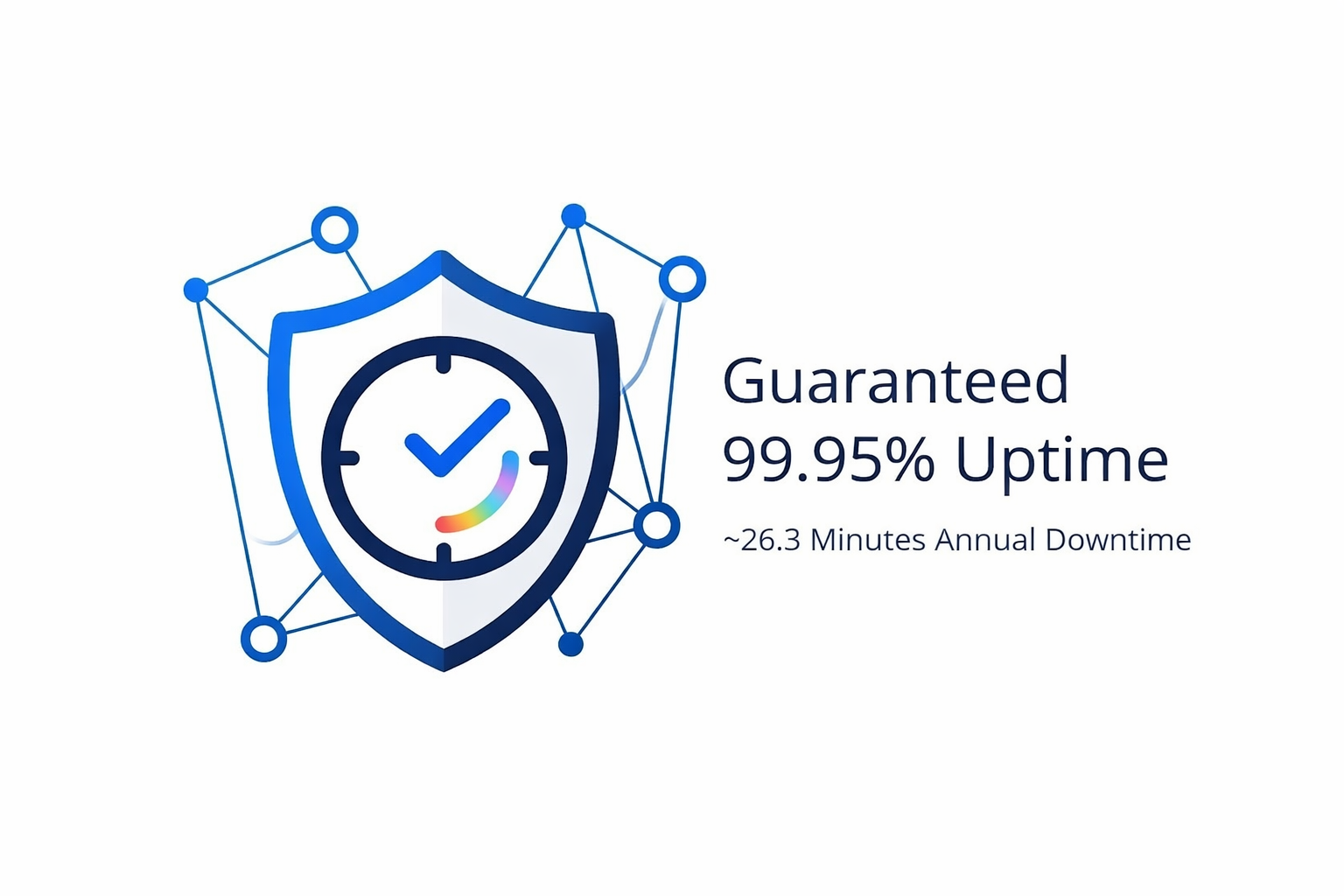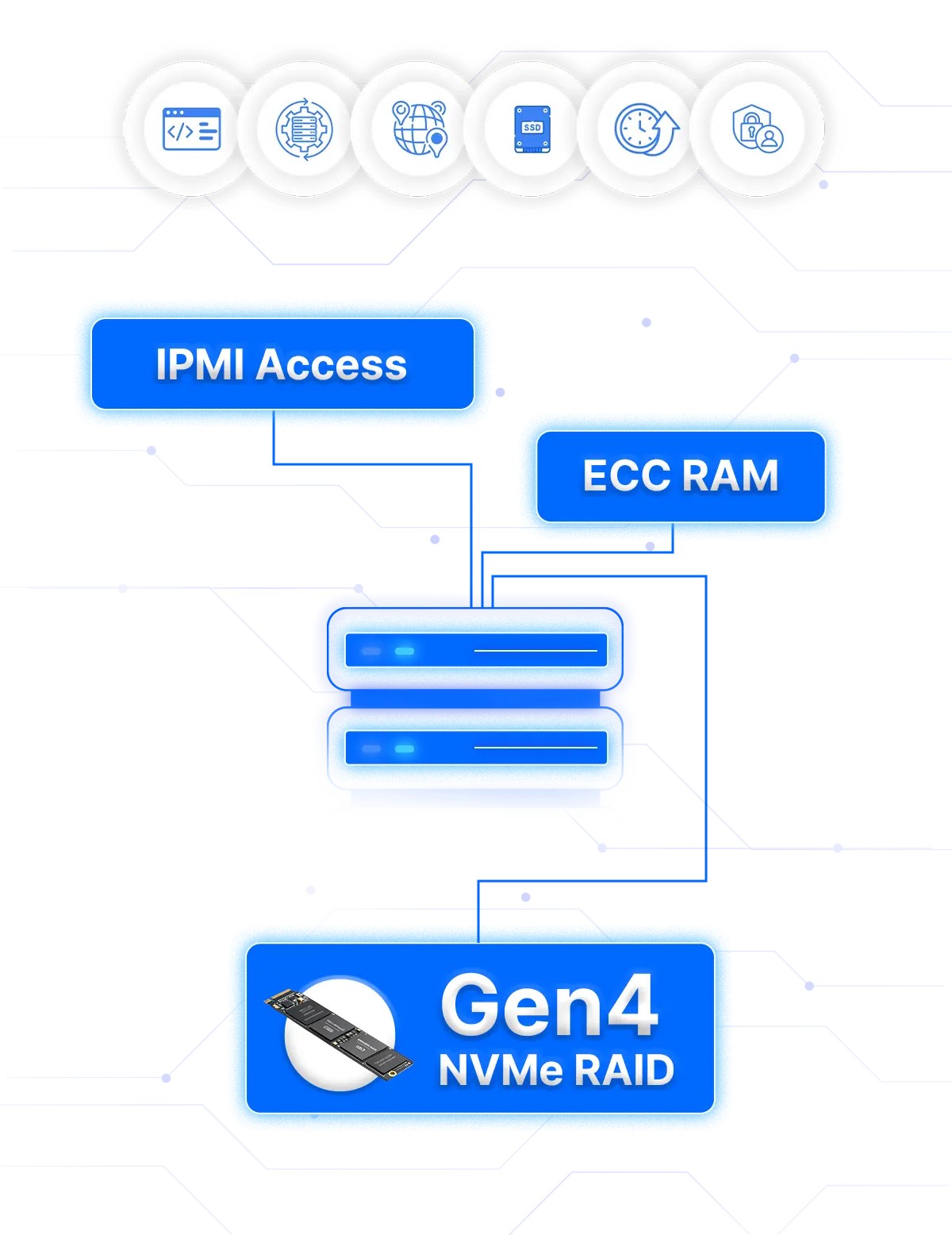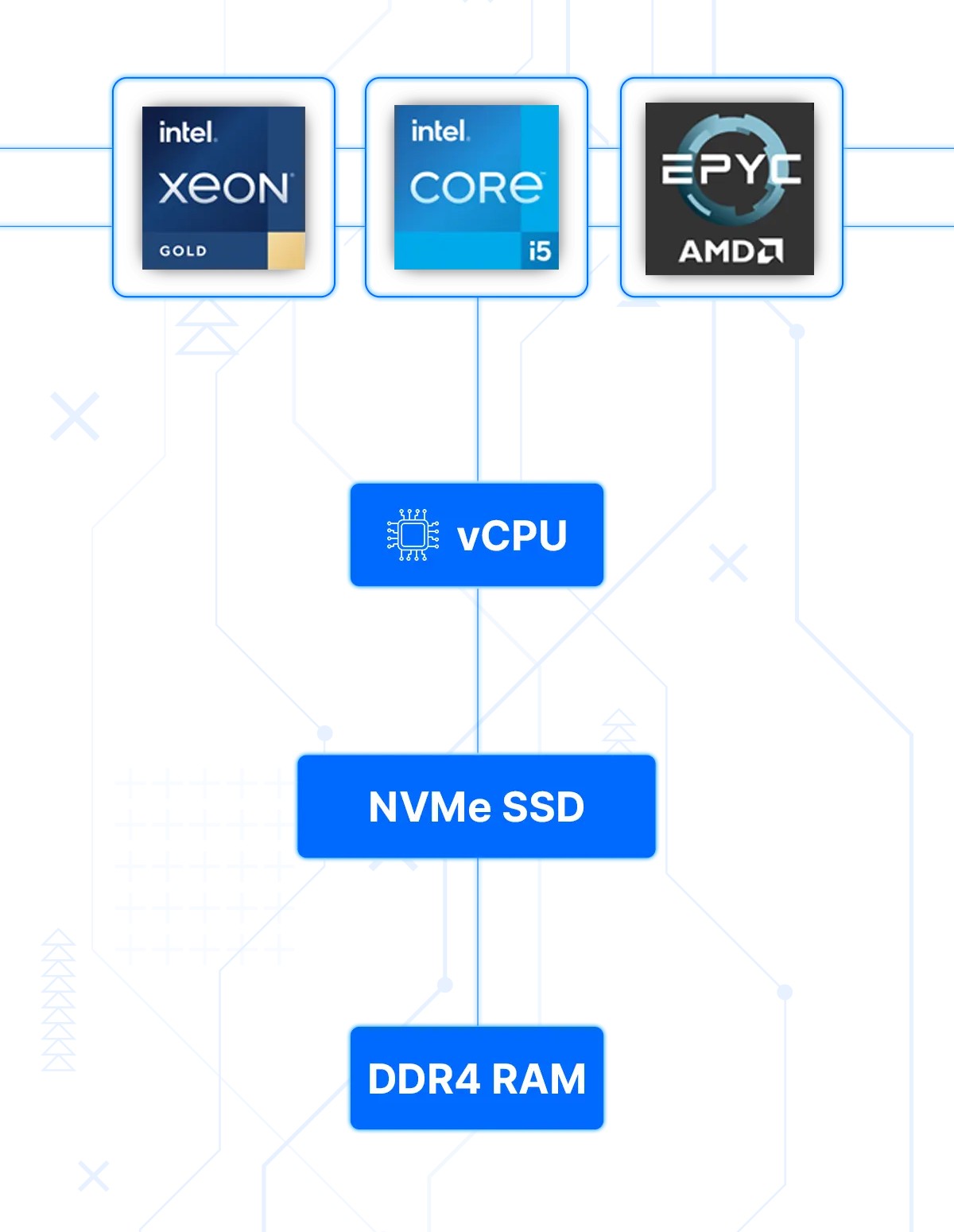India's First IT Infrastructure Partner Delivering Scalable Hosting needs.
Vyom Cloud powers the digital backbone of businesses–delivering lightning-fast, resilient, and scalable cloud infrastructure that keeps every service running, every request answered, and every Ambition moving forward
Explore our products
Discover Vyom Cloud's IT infrastructure built to work your way – whether you prefer full control with unmanaged services or the confidence of expert-backed support.
Bare-metal power for mission-critical apps
Run intensive workloads on isolated hardware with ECC RAM, IPMI access, and Gen4 NVMe RAID for uncompromising performance and reliability.
Proactive monitoring & 99.9% SLA
Stay online with DDoS protection, out-of-band IPMI access, and around-the-clock monitoring backed by strict SLAs.
- ECC RAM + Gen4 NVMe RAID
- Full IPMI/KVM access
- Network DDoS protection
- Private VLAN available
See bare-metal in action
Provision, monitor, and manage your server lifecycle with our tools and team.
- OS install and RAID profiles
- Secure remote management
- Performance tuning options
Scale in seconds with SSD VPS
Get dedicated vCPU and RAM with KVM virtualization, fast NVMe storage, and snapshots for safe upgrades.
Snapshots & automated backups
Roll back fast with instant snapshots and weekly/daily backups. Experiment freely and restore in a click.
- 1 vCPU (core)
- 1 GB RAM
- 10 GB Storage
- 0.10 TB Traffic
- 100 Mbps Bandwidth
- Monthly Price: ₹360
Register in minutes
Create your account, verify your email, and log in easily.
- Quick sign-up process
- Simple account setup
- Start deploying instantly
Secure rack space with A/B power
Place 1U–full racks in Tier III facilities with redundant power and cooling, biometric access, and 24/7 NOC.
Carrier-neutral connectivity
Cross-connects, private VLANs, and diverse uplinks ensure low-latency, redundant paths to the internet.
- 1U Rack Space
- Up to 0.5 kW Power (A+B)
- 100 Mbps Premium Bandwidth
- 1 IPv4 + IPv6 /64
- Remote Hands 30 mins/mo
- 24/7 Biometric Access & CCTV
- DDoS Protection
- 99.9% Uptime SLA
- Standard Cross Connects
Tour the facility
See power, cooling, and security controls that keep your gear safe and online.
- Biometric + CCTV
- Carrier meet-me rooms
- On-demand remote hands
Self-host n8n with full control
Build and run automations on dedicated resources. Deploy with Docker and scale as your workflows grow.
Managed updates & monitoring
Keep n8n secure and performant with automated updates, SSL, and proactive monitoring.
- 1 vCPU core
- 4 GB RAM
- 50 GB NVMe Disk
- 4 TB Bandwidth
- Data centers worldwide
- Linux operating systems
Automate anything
Connect SaaS, databases, and webhooks to design powerful workflows.
- 200+ nodes & triggers
- Schedules & retries
- Versioned deployments
AMD EPYC processors and NVMe SSD storage
Enjoy top performance with NVMe SSD storage and EPYC processors powered by HPE infrastructure. Our KVM virtualization platform gives you full control of your hosting environment.
Server backups and snapshots
Your data is safe with automated weekly backups. Make major changes confidently with daily backups or manual snapshots. Restore your VPS in just a few clicks.
- 50 GB SSD
- Daily Backups
- Windows Server
- Secure RDP Access
Tour the facility
See power, cooling, and security controls that keep your gear safe and online.
- Biometric + CCTV
- Carrier meet-me rooms
- On-demand remote hands
7-Day Money Back Guarantee
Experience VyomCloud with complete confidence. If our services don't meet your expectations, simply request a refund – we'll process it promptly with no questions asked.
Learn More
Enterprise Cloud Infrastructure Solutions
Persistent compute, high-throughput storage, scalable runtime environments–everything you need to go from "uhhh" to agent, fast.
A unified agentic cloud to build full-stack AI apps
Train, fine-tune, and run cost-effective inference on infrastructure designed for building, deploying, and scaling high-performance apps and agents.
Our platform brings together compute, storage, networking, and orchestration into a single, developer-friendly environment–removing operational complexity so your teams can focus on innovation.


Stay on budget and grow your business
With predictable pricing–plus generous bandwidth and low inference costs–there are never any surprises about what you will pay for our products.
Transparent billing models and usage-based plans allow you to forecast expenses accurately while scaling your infrastructure with confidence.
Frustration-free support from real people
Get free, personalized support or upgrade to paid plans to receive even better and faster response times.
Our cloud experts work closely with your team to resolve issues quickly, optimize performance, and ensure your workloads run smoothly at all times.


Delight your customers by building on a reliable platform
Our globally distributed bare-metal servers, SLAs, and intuitive products help you consistently deliver experiences your customers will love.
Built for reliability and performance, our infrastructure ensures high availability, low latency, and enterprise-grade security across regions.
We're Not Just Another Hosting Company
Trusted by 15,000+ customers and powering 10,000+ websites, we drive business growth with reliable hosting, email, and security solutions.
HTTP API Integration
Integrate your existing business applications with our flexible HTTP APIs and manage your cloud infrastructure seamlessly with full automation and control.
Network Guarantee
22 Tbps network capacity with ultra-fast connectivity and low latency performance.
We provide up to 22 Tbps network capacity backed by Tier-4 datacenters, ensuring ultra-fast connectivity, low latency, and strong DDoS resilience.
Powerful Hardware
High-grade, fault-tolerant servers optimized for critical and high-load workloads, delivering consistent performance even under heavy traffic.

High Availability Infrastructure
Redundant systems, automatic failover, and 99.95% uptime SLA ensure your services stay online when it matters most.
Enterprise-Grade Security
DDoS protection, network firewalls, and SOC 2 compliance safeguard your data against evolving threats.

Priority Support & contact
24x7 support with KVM/IPMI automation access to end user Thankfully.

99.95% Uptime Guarantee
Enterprise-grade infrastructure engineered for maximum availability, ensuring your services stay online with minimal downtime.
Guaranteed 99.95% uptime, resulting in only ~26.3 minutes of downtime annually, ensuring your services stay online when it matters most.
Flexible and Scalable
Host unlimited domains, create unlimited email addresses, databases, FTP accounts, & more.
What Our Clients Say

Vyom Cloud's VPS hosting has been a game-changer for us. The uptime is phenomenal, and the performance is unmatched at this price point. But what really sets them apart is their incredible scalability – we've been able to expand resources seamlessly as our business grows. Their team is always ready to assist – it's like having an in-house IT department without the overhead!
Have questions?
Vyom Cloud has the answers.
Everything you need to know about Vyom Cloud.
Vyom Cloud is a cloud infrastructure provider offering VPS, dedicated servers, colocation, and managed services built for developers, startups, and enterprises.
Simply create an account, verify your email address, log in to the control panel, and choose the product that fits your workload. You can deploy servers in just a few minutes.
Yes, Vyom Cloud provides a 7-day money-back guarantee on eligible services so you can try the platform with confidence.
You can reach Vyom Cloud support through the client portal, email, or ticketing system for billing, sales, and technical questions.
Yes, all VPS and Dedicated Servers from Vyom Cloud come with full root or administrator access, giving you complete control over your server environment.
Vyom Cloud supports popular Linux distributions such as Ubuntu, Debian, AlmaLinux, Rocky Linux, and also offers Windows Server options on supported plans.
Yes, Vyom Cloud allows easy upgrades of CPU, RAM, and storage so your infrastructure can scale smoothly as your business grows.
Vyom Cloud delivers consistent high performance using enterprise-grade hardware, NVMe SSD storage, and high-speed networking.
Colocation hosting allows you to house your own servers in our secure, Tier III data centers with redundant power, cooling, and network connectivity, while maintaining full control over your hardware.
Vyom Cloud offers flexible colocation options from 1U rack space up to full cabinets and private cages, depending on your infrastructure needs.
Our facilities feature 24/7 security monitoring, biometric access control, CCTV surveillance, and multi-layer physical security to protect your equipment.
Yes, Vyom Cloud offers remote hands support with 30 minutes included monthly and additional hours available on-demand for hardware maintenance, reboots, and troubleshooting.









